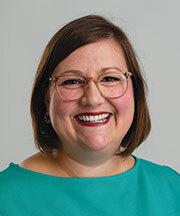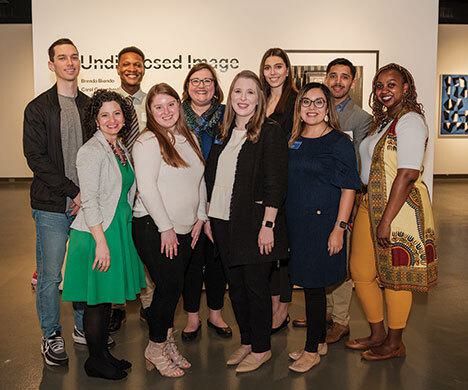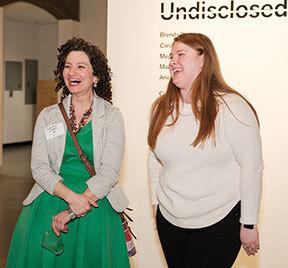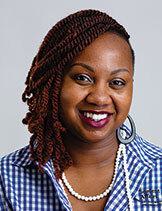All Voices at the Table: Alumni Invited to Pitch in Talents, Interests
by April Marciszewski
Megan Hornbeek Allen (BA Religion ’03) wants alumni to know they have a place, they will be taken seriously, and they have opportunities to get involved, ranging from one-time events to longer-term volunteerism.
“I think the alumni voice is critical to a long future,” said Hornbeek Allen, Oklahoma City University’s alumni engagement director. “There is something immeasurable about the resources that the OCU alum provides to current students.”

The Alumni Association remains free, and the alumni board has been renamed the Alumni Advisory Board to reflect its role of supporting university goals, Hornbeek Allen said. As the board kicks off with newly elected leaders this fall, it is focused on fundraising, student recruitment, and alumni events/engagement.
“If you don’t see yourself on one of these three committees, I still want to know where you see yourself,” she said.
New board President Kimberley Worrell (BS Dance Management ’08) wants to get a diverse representation of alumni involved this year.
“Alumni engagement is indicative of the health of the university,” she said.
Worrell and her husband, Erick (BA Public Relations ’07), met at OCU, got married in the Bishop W. Angie Smith Chapel, and want to see the university succeed, she said.
“Almost every professional connection I’ve made since I graduated has been through an OCU relationship one way or another,” said Worrell, director of development for the Oklahoma City Museum of Art. “It’s important for alumni to stay engaged with their university so students can have the same or better experience than they did.”
Hornbeek Allen has worked to build a sustainable structure for alumni involvement. The board presidency is a two-year commitment, one step down are committee chairs, and volunteer opportunities range from one-time events to ongoing committees.
“I want to make sure everyone sees themselves as having a place in the Alumni Association and nobody is in a position of burning themselves out,” she said. “You can find a role where you have a skill set. You don’t necessarily have to have a role that’s a long-term commitment.”
Hornbeek Allen is working to make existing alumni chapters official so OCU can support them and provide them with information and so chapters and OCU can collaborate. She also wants to create new alumni chapters and establish a liaison at each chapter to share information between OCU and local alumni. That will also allow chapters to share ideas.
Club and chapter kickoff events may shift online for now, and homecoming has the potential to be even bigger than last year with a virtual format, she said.
As an alumna, Hornbeek Allen values tradition and sees a bridge between history and the future, with diversity and the ongoing progress in race relations.
“I think there’s something special about OCU,” she said. “OCU made me. I think these ideas are in me because of OCU.”

Lending Career Lessons
by April Marciszewski
How can current students benefit from the wealth of professional experience that alumni have amassed?
For several years, various Oklahoma City University staff members pieced together informal programs to pair students and alumni for career mentorship. Then in fall 2019, everything fell into place. The Alumni Engagement office recruited alumni mentors. The Career Services office put out an application for interested students.
In a game show-style ceremony, OCU revealed a mentor for each participating student. Kanika Brown, Career Services director, put together curriculum to get the mentorship conversations started, so mentors and mentees would be prepared to discuss resumes, career exploration, interviewing skills, networking, and more.
And then the magic started to happen.
Erick Worrell (BA ’07) texted Megan Hornbeek Allen, OCU’s director of alumni engagement, with a message from his mentee that said: “Whoever matched us up is an angel. You’re the best mentor.” Rachel Morse (BA Religion ’96) in U.S. Rep. Kendra Horn’s office, rolled out the red carpet for then-sophomore Abby Banks, who went on to be elected SGA president, Hornbeek Allen said. Multiple mentors applied to help a second year.
The Alumni Mentor Program had about 30 alumni-student matches in 2019–20 and has about 35 matches this school year.
“I just had no idea the impact that Jennifer could have on my life, and because of the Alumni Mentor Program, she will be in my life forever,” religious education senior Addison Saviers said of Jennifer Seal (BA and BMEd ’98).

Seal said she was a lot like Saviers when she attended OCU: “very Type A.”
“I have hopefully reduced her stress because she puts a lot of pressure on herself,” said Seal, president of the Putnam City Schools Foundation.
When they met, Saviers asked, “How do you pick a grad school? How did you know what you were going to do?” Because of their relationship, she learned, “you don’t have to have it figured out right now.”
Now Saviers is working on her graduate school application. She and Seal are continuing as a mentor program pair this year.
The program “really shows me that OCU cares a lot about students moving forward in life,” Saviers said.
Seal described the program as “an entrée back into the university community that gives alumni a chance to use their skills and their life lessons, even if they live far away. It could be a way for them to still be a part of OCU’s family that doesn’t really take a lot of time and doesn’t really cost a lot of money.”
“I’m glad OCU offers these types of mentoring opportunities to give a more robust college experience to these kids and help them find their place in the world,” she said.

Brown, who also serves as OCU’s Black Student Association adviser, wants to diversify the mentor pool in coming years so students of color have people they’d be more comfortable asking career questions specific to them, like how to wear their hair in the workplace.
“Those are the students who really do need a mentor to explain to them those difficulties,” she said. “It’s a lot different being a woman of color or man of color working.”
Brown sees the relationships as something that can endure even after students graduate.
